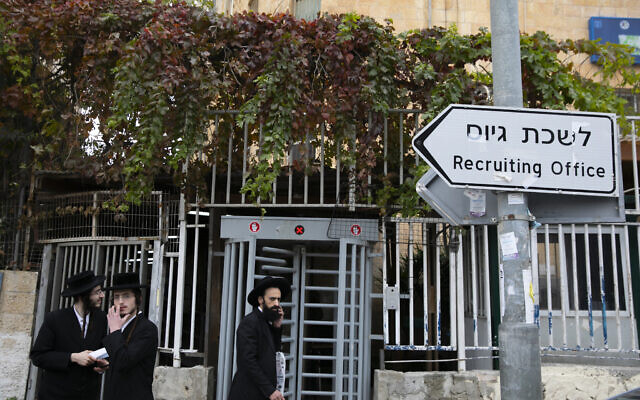A top ultra-Orthodox lawmaker said Thursday that Israel should place the same emphasis on Torah study as it does on defense, becoming the latest senior figure in the likely incoming government to recommend the adoption of laws based on biblical strictures.
United Torah Judaism’s Moshe Gafni, who is currently pushing for legislation to formalize a blanket exemption from compulsory military duty for full-time yeshiva students, said yeshiva students can serve in the military, but only if they are replaced in the religious seminaries by those who would otherwise be going into the military.
“There can’t be a Jewish state with no corps of Torah students,” he told a conference in Tel Aviv.
“When there were bloody wars during the reign of King David, the prophet came to King David and said to him, ‘Half the people will study Torah and half will serve in the army, and they’ll switch,’” Gafni added.
The UTJ Knesset member proposed a similar arrangement for contemporary Israel.
Get The Times of Israel's Daily Edition by email and never miss our top stories
“Students at Ponevezh Yeshiva will go to the army, to combat roles, but bring high school students to study Torah at the same time,” he said, referring to a prestigious Haredi yeshiva in his hometown of Bnei Brak.
Gafni added that every person “does what he can to serve his country, to serve his people.”

Ultra-Orthodox men walk outside the IDF recruitment office in Jerusalem, on December 5, 2019. (Olivier Fitoussi/Flash90)
He also claimed it was impossible to combine military service and university studies.
“Our people, who underwent Holocausts, disasters, the Inquisition and the Crusades, ultimately returned to their land because of the fact that it always had Torah students,” he said.
The outgoing deputy defense minister slammed Gafni’s remarks.
“This comment will lead to the end of the people’s army and to anarchy. Instead of this divisive formulation, I suggest a unifying one: Everyone studies and everyone serves,” Alon Schuster told Radio 103 FM.
Gafni’s comment comes after Religious Zionism head Bezalel Smotrich, who is set to become finance minister, told a magazine that he planned to implement fiduciary policies based on the Bible.
“They’ve tried many different economic systems, right? They tried capitalism, neo-socialism, but there’s one thing they didn’t try — an economic approach called ‘So if you faithfully obey,’” Smotrich told Haredi weekly Mishpacha, citing a verse in Deuteronomy promising abundant rainfall and harvests if the Jewish people follow God’s commandments.
The issue of drafting ultra-Orthodox young men into the military has been a central focus in coalition talks between UTJ and presumed incoming premier Benjamin Netanyahu, who is working to form a government after the right-religious bloc he leads won a majority of Knesset seats in general elections last month.
During Thursday’s appearance, Gafni refused to address proposed legislation exempting yeshiva students from IDF service.
“I want there to be a status quo. I won’t get into details about the enlistment law,” he said.

Ultra-Orthodox Jews in Jerusalem clash with police as they protest against the arrest of a draft-dodging yeshiva student, December 22, 2020. (Yonatan Sindel/Flash90)
The November election was the fifth time Israelis have gone to the polls since a Netanyahu-led government disbanded in late 2018, in part due to opposition from his ultra-Orthodox allies to proposed legislation anchoring some exemptions in law but eventually imposing quotas on yeshivas. That proposal was formulated in response to a 2017 High Court of Justice ruling striking down a previous law that had granted wider exemptions.
In response to the court decision, UTJ and the fellow Haredi Shas party have also been advocating for a so-called override clause that would allow the Knesset to overturn High Court rulings, clearing the way to approve legislation on exemptions previously struck down by courts.
Far-right factions allied with Netanyahu and members of his Likud party also back the override clause, and some have floated proposals that could lead to the termination of his ongoing trial on corruption charges.
The proposed judicial changes — particularly the override clause — have been denounced by Netanyahu’s political rivals, prominent legal figures like the head of the Israel Bar Association, a group of law professors, and prominent American lawyer Alan Dershowitz.


